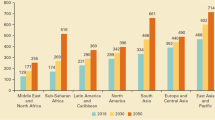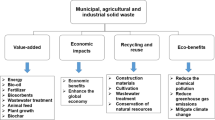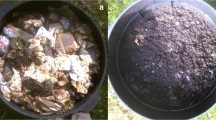Abstract
Widespread vegetable wastage in Indian markets is a pressing issue, driven by factors like inadequate storage, inefficient transport, improper handling, and a lack of standardized packaging and grading. This wastage results in substantial economic losses for farmers and traders and adverse environmental effects, including increased landfill waste, greenhouse gas emissions, and pollution. Moreover, rotting vegetables in markets pose health risks and compromise food safety. To combat this problem, a comprehensive research study has been conducted, employing a mixed-method approach. This research combines quantitative and qualitative methods, including a questionnaire survey of 100 residents, structured surveys, and in-depth interviews with relevant stakeholders. The study investigates the causes and consequences of vegetable wastage in Indian markets, with a particular focus on its environmental and public health impact. The research also proposes a systematic waste management procedure to address these issues and mitigate potential drawbacks. By uncovering the root causes, assessing the effects, and offering practical solutions, this study aims to contribute to a sustainable and efficient waste management system in Indian vegetable markets. The findings and recommendations in this research serve as a foundation for policymakers, market authorities, farmers, and other stakeholders to develop effective strategies and policies for waste reduction and management in vegetable markets.











Similar content being viewed by others
Availability of Data and Materials
All data used in this review paper are from publicly available sources and previously published literature. Proper citations and references have been included to ensure transparency and acknowledge the contributions of the original authors.
References
Sheoran A RM (2015) Scope of supply chain management in fruits and vegetables in India. J Food Process Technol. https://doi.org/10.4172/2157-7110.1000427
Naikare SM (2020) “Utilization and management of food waste”, Research anthology on food waste reduction and alternative diets for food and nutrition. Security. https://doi.org/10.4018/978-1-7998-5354-1.ch028
Prasad K, Paul JR (2021) Postharvest losses of papaya and practice for management. Food Sci Rep 2
Mozhiarasi V et al (2019) Variations in generation of vegetable, fruit and flower market waste and effects on biogas production, exergy and energy contents. J Mater Cycles Waste Manag. https://doi.org/10.1007/s10163-019-00828-2
Pradyumna A, Mishra A, Utzinger J, Winkler MS (2022) Health in food systems policies in India: a document review. Int J Health Policy Manag. https://doi.org/10.34172/ijhpm.2021.18
Hantoko D, Li X, Pariatamby A, Yoshikawa K, Horttanainen M, Yan M (2021) Challenges and practices on waste management and disposal during COVID-19 pandemic. J Environ Manag. https://doi.org/10.1016/j.jenvman.2021.112140
Boyer D, Ramaswami A (2017) What is the contribution of city-scale actions to the overall food system’s environmental impacts?: assessing water, greenhouse gas, and land impacts of future urban food scenarios. Environ Sci Technol. https://doi.org/10.1021/acs.est.7b03176
Chanakya HN, Ramachandra TV, Guruprasad M, Devi V (2007) Micro-treatment options for components of organic fraction of MSW in residential areas. Environ Monit Assess. https://doi.org/10.1007/s10661-007-9711-5
Sahu P, Shelare S, Sakhale C (2020) Smart cities waste management and disposal system by smart system: a review. Int J Sci Technol Res 9(3)
Goutam Mukherjee A et al (2021) A review on modern and smart technologies for efficient waste disposal and management. J Environ Manag. https://doi.org/10.1016/j.jenvman.2021.113347
Alam O, Qiao X (2020) An in-depth review on municipal solid waste management, treatment and disposal in Bangladesh. Sustain Cities Soc. https://doi.org/10.1016/j.scs.2019.101775
Ke J, Cai K, Yuan W, Li J, Song Q (2022) Promoting solid waste management and disposal through contingent valuation method: a review. J Clean Prod. https://doi.org/10.1016/j.jclepro.2022.134696
Das MK, K R (2016) Management of wastes from vegetable processing industry—a review. Adv Life Sci 5(7)
Sarnobat M, Kulkarni G, Mali S (2019) Characterization of market solid waste at source in Kolhapur City, Maharashtra, India. Adv Waste Manag. https://doi.org/10.1007/978-981-13-0215-2_33
Mondal S, Das S, Banerjee S, Pal K (2022) A smart automated garbage management system to replace human labour. In: ICDCS 2022—2022 6th international conference on devices, circuits and systems. https://doi.org/10.1109/ICDCS54290.2022.9780783
Plazzotta S et al (2018) Power generation using biogas—application to industries/rural area—case study, vol 17. Gujarat Energy Research & Management Institute (GERMI)
(2020) Requirements of solid waste management system in Savina Vegetable Market at smart city Udaipur in Rajasthan. Int J Eng Adv Technol 9(3S). https://doi.org/10.35940/ijeat.c1007.0393s20
Kumar P, Rani S (2022) Sustainable solid waste management in vegetable markets: a case study in Patna, India. 2:129–141
Dey S, Khaterpal N (2022) Food waste in India: current scenario and Future perspectives. J Environ Manag 1(7):114–124
Sharma P, Pandey D, Roy M (2021) A systematic review of food loss and waste management in India. J Sustain Prod Consum 2(28):1380–1392
Gupta A, Aggarwal R (2020) Food loss and waste in fruit and vegetable supply chains in India: a review. Int J Renew Sustain Energy Rev 7(15):462–489
Singh A, Devi K (2020) A systematic review on challenges and opportunities for food waste management in India. J Appl Manag 2(5):103–118
Verma R, Ray D, Mishra S (2019) Postharvest losses in vegetables and their implications on sustainable agriculture in India. J Environ Biol 40(6):1135–1142
Nambiar V, Jayachandran C (2018) Waste management in vegetable markets: a case study in Chennai, India. 119:789–797
Chowdhary R, Tiwari M (2017) A study on post-harvest losses of vegetables in India: a review. Int J Curr Microbiol Appl Sci 6(10):360–368
Negi S, Anand N (2017) Post-harvest losses and wastage in Indian Fresh Agro Supply Chain Industry: a challenge
Hassan SH, Aziz HA, Johari I, Hung Y-T (2022) Construction and demolition (C&D) waste management and disposal. https://doi.org/10.1007/978-3-030-89336-1_3
Upadhyay H, Banik D, Siddique A, Kumar A (2018) Aeromycoflora of fruit and vegetables market environment and their proper management towards a sustainable environment. Plant Arch 18(2)
Nazir J, Khan SH, Parveen K, Afroza B, Shabir A (2016) A review on organic farming in vegetable sector. Asian J Horticult. https://doi.org/10.15740/has/tajh/11.1/208-217
Lal R (2017) Restoring soil and water resources and mitigating climate change in India by judicious management of agricultural and urban wastes. J Indian Soc Soil Sci. https://doi.org/10.5958/0974-0228.2017.00014.7
Heeb A, Lundegårdh B, Savage G, Ericsson T (2021) Development of organic fertilizer and compost bin for home gardening. Food Agric Spectr J 2(02)
Srivastava V, Balakrishnan M (2022) Biorefinery approach for the management of fruit and vegetable waste generated in hotels: study case in India. Biomass Convers Biorefin. https://doi.org/10.1007/s13399-022-03291-6
Acknowledgements
We extend our heartfelt appreciation to all individuals who contributed to the development and validation of the proposed waste management system in the Indian vegetable market. This includes the cooperation and support of customers, vendors, local residents, waste management authorities, and all others who generously shared their insights, time, and expertise. Their invaluable contributions were fundamental in shaping this research and making it both rational and viable.
Funding
This paper was not funded by any specific grants, organizations, or individuals. The authors have independently conducted the research and compiled the information without financial support from any external entities.
Author information
Authors and Affiliations
Contributions
All authors have collectively made substantial contributions to the conception, analysis, interpretation of the literature review, implementation of methodology, and drafting and writing manuscript.
Corresponding author
Ethics declarations
Conflict of Interest
On behalf of all authors, the corresponding author states that there is no conflict of interest. No financial or non-financial interests have influenced the conception, design, implementation, analysis, or interpretation of the information presented in this paper. The authors have no financial or proprietary interests in any material discussed in this article.
Ethical approval
As this study did not involve any specific institution, formal ethical approval was not required for the research conducted on waste management in the Indian vegetable market. However, all efforts were made to uphold ethical standards in data collection, analysis, and reporting, ensuring the anonymity and privacy of individuals involved in the study.
Informed consent
Informed consent was obtained from all individual participants included in the study.
Rights and permissions
Springer Nature or its licensor (e.g. a society or other partner) holds exclusive rights to this article under a publishing agreement with the author(s) or other rightsholder(s); author self-archiving of the accepted manuscript version of this article is solely governed by the terms of such publishing agreement and applicable law.
About this article
Cite this article
Kaur, R., Dey, T.D., Pandey, D. et al. Sustainable Assemblage of Clustered Wastages and Meticulous Exertion of Disposal System: A Comprehensive Review. Adv. Astronaut. Sci. Technol. (2023). https://doi.org/10.1007/s42423-023-00141-z
Received:
Revised:
Accepted:
Published:
DOI: https://doi.org/10.1007/s42423-023-00141-z




